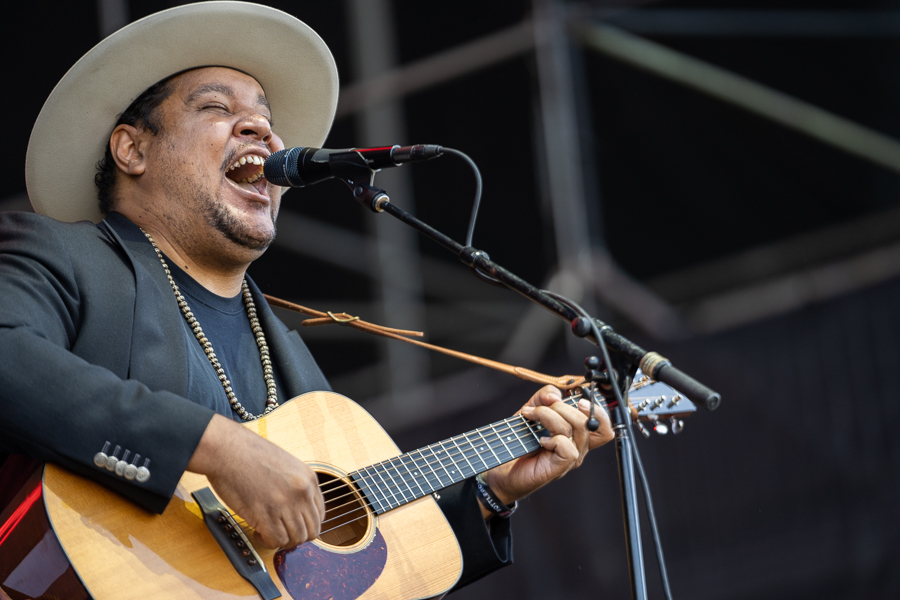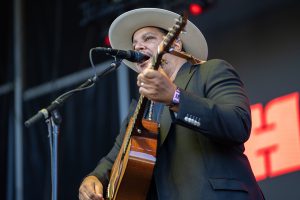Q&A: Chris Pierce opening hearts and changing the face of Americana

Chris Pierce performs at BottleRock Napa Valley at the Napa Valley Expo on Sept. 5, 2021. Adam Pardee/STAFF.
Chris Pierce has been busy. Between his Americana-flavored trio Leon Creek, his soulful collaboration with Sunny War (War & Pierce), and his hard-hitting blues-folk solo album American Silence, it’s surprising he still has time to co-write hit songs like “We Can Always Come Back to This,” which was featured prominently on the television show “This Is Us.”
Far From Broken
Leon Creek
Mezcal Road Records, out now
Pierce’s philosophy is “to strike while the iron is hot,” he said in a video call this week, exactly a month after his set at BottleRock Napa Valley, where his set turned heads. In addition to Leon Creek, which includes musicians Matt Stevens and Eric Jansen, he’s also written a blues opera called “Reverend Tall Tree.” The new Leon Creek album, Far From Broken, began when friends Stevens and Jansen reached out with the concept. The trio actually began writing just before the pandemic began.
“We’ve created a sound that I think pushes this great eclectic field of Americana music, and we took country sounds, roots sounds, banjo and pushed the envelope on production and effects,” he said.
RIFF: Far From Broken does have that modern twist on Americana, some synths, some 808s. There are a lot of new up-and-comers bringing a fresh sound to Americana right now. Do you think now feels like the right time for that?
Chris Pierce: I do, on so many levels. … I think there are artists of diversity that have been doing it for a long time and creating these sounds, and there’s a new openness for sounds that have been overlooked, for some folks culturally that maybe weren’t as accepted in the field of Americana before. Things are a little different now. For me, I’ve been able to dive in and open my arms and heart and show what I have and what I’ve been doing, from my album American Silence that came out this year, to War & Pierce, to Leon Creek. These are all parts of what defines Americana that are actually being embraced now. So many other artists that I know that have just been working over the years trying to get albums heard and to be accepted are starting to blow up. It’s a really exciting time.
It seems like there’s a contrast between the Leon Creek album and American Silence. American Silence is very serious, very issue-oriented and the Leon Creek album is lighter, more about hope and making it through. Are they two sides of the same coin?
Chris Pierce: Yeah, American Silence; that album was really a stream of consciousness that started last March with us all being still and uncertain about the future, and about our own health, and that of our friends and family, and loved ones. … I feel like folks finally had the time to take in some of the inhumane aspects of our society, the oppression, the trauma that’s carried generationally. … I don’t think it was that their hearts didn’t have the capacity for it before. I think it was their schedules didn’t. And then they had the time to soak a lot of things in. Folks were not rushing around. They were at home and they were able to see, read, research and actually open their hearts and emotional selves to the fact that a lot of these things were happening around them. …
In contrast, with the Leon Creek album, I feel like a lot of those songs were coming from a place of no matter what happens, no matter where you are, even if you have just a sliver of hope left, there’s a reason to keep on going. … I think it’s important in music to be thinking about what you’re going to leave behind as a songwriter, as a creator, to leave behind a broad spectrum of emotional content and perspective.
Were you thinking specifically about your legacy and what you want to put out into the world?
Chris Pierce: Yeah, I always think about how each one of us have our own unique voice and perspective, and I’ve learned to value my own. And I really try to preach that to everybody. … It’s about creating a place where we can have civil conversations with each other with different ideas and bring those out and really listen with our hearts and speak about things that are sometimes uncomfortable. And sometimes there’s just different perspectives. … I’ve had intolerance thrown at me all my life, but I feel like I’m one of the lucky ones because I actually have an outlet to express myself. I always think to myself, “What if I didn’t have music? What if I wasn’t a songwriter?” I just feel so blessed to have music in my life.
Do you ever find that it’s difficult explaining your experiences to people who’ve not lived them themselves?
Chris Pierce: I feel like I have a unique perspective with that simply because I was raised by a white mother and a Black father, and I’ve had opportunities to really embrace both sides of my heritage and be around people, different family members, different voices, different perspectives. At the same time, I was raised around a lot of intolerance around my own parents’ love for each other, a cross burning on our lawn in California, in Pasadena, but I saw firsthand how my parents struck back and they combatted that with demonstrating their love for each other.
[They were] doing it in a very loud way, and for me that demonstration early on gave me the understanding that I can get upset and angry at folk and push back in different ways, but for me, the best way to disarm and combat and strike back is with great thought and great care and with a sense of compassion for. Imagine going through life hating somebody because of the color of their skin, or because you’re just afraid to know or the miseducation you have, or because your father and mother told you one thing, and you have no proof of, and holding that in your heart.
I personally try to remember these things when dealing with folks that are intolerant, standing right there in front of me. … I traveled all over the United States since June; places like Waco, Texas, West Virginia. I came back to California, my home state, and had a man confront me about one of the songs on American Silence in person at my CD booth after a show. With expletives and waving his arms and telling me to shut up when I tried to interject. … The last thing I wanted to do was give that man an example of a reason to hate me even more. And ironically enough, this was at a blues festival, and I said, “Sir, you’re at a blues festival, and you’re upset about a Black man singing about oppression and hatred. … Do you actually know where the blues come from? You bought the ticket, but you don’t want to hear?” …
Has it been hard touring during the pandemic? You got a great response at BottleRock.
Chris Pierce: Traveling has been a little difficult. I’ve been fully vaccinated since March, but I’m extremely careful when traveling. … The response has been overwhelming for American Silence, and playing those songs live. It’s kind of beyond my wildest dreams. I’ve been doing this for a long time, and I feel like these songs are really resonating with folks, and they’re showing up and they’re filling the venues. I’ve never until this year done a concert where I got two or three standing ovations during a set. … I feel like those standing ovations are because the connection is being made emotionally. I feel like it’s also because folks really miss live music and miss feeling that way and having somebody demonstrating vulnerability on a stage. Perhaps it’s really the right time for my voice. And maybe this is a really special time for me, and I should just take as many gigs as I can, and travel around as much as I can, and just kinda sing ’til I drop.
Does your solo work and Leon Creek cut into the time you’d be spending on War & Pierce?
Chris Pierce: No, War & Pierce is going great. … We’re planning on an album release for February of 2022. It’s from a catalog of songs we’ve been writing for about a year and a half, as well as a handful that have just recently been written that I’m really, really excited about. … I’m so inspired by working with Sunny. She’s just an incredible talent and a visionary artist, and our song “Amen” has really been doing great. We made it onto something like 20 playlists on Spotify, had over 2 million listens on the song. As far as touring goes, I’ll be doing with some appearances with Sunny as War & Pierce next year.
All the things you do, all the projects you’ve got, do you still do those co-writes?
Chris Pierce: I do co-writes all the time; I have one tomorrow. I do a lot of them on Zoom and I’m busier right now, so I have to be honest with myself. … Creatively, right now I feel as open as I’ve ever been to ideas and ways of expression. I know as a writer, sometimes in your life, it’s just flowing like a river. I’m riding along with it, trying to be as open as I can to write with as many people as I can.
It’s been a challenging time for everyone. Pre-pandemic, I had to have surgery. I went deaf when I was 15 … but I think my deafness actually makes me more open, and it makes me listen in a different way than I would if I have perfect hearing and make me even more open to sounds and ideas and perspectives. It’s been a wild ride, being a deaf musician. But I don’t think it defines me. I don’t think it limits me in any way. I think it makes me more limitless because I can really dig in and express myself with a lot of the things I don’t hear, or can’t hear, so I feel like I push even more emotionally than I would when I’m singing and performing to reach the hearts of people.
Follow Rachel Alm at Twitter.com/thouzenfold and Instagram.com/thousandfold.

